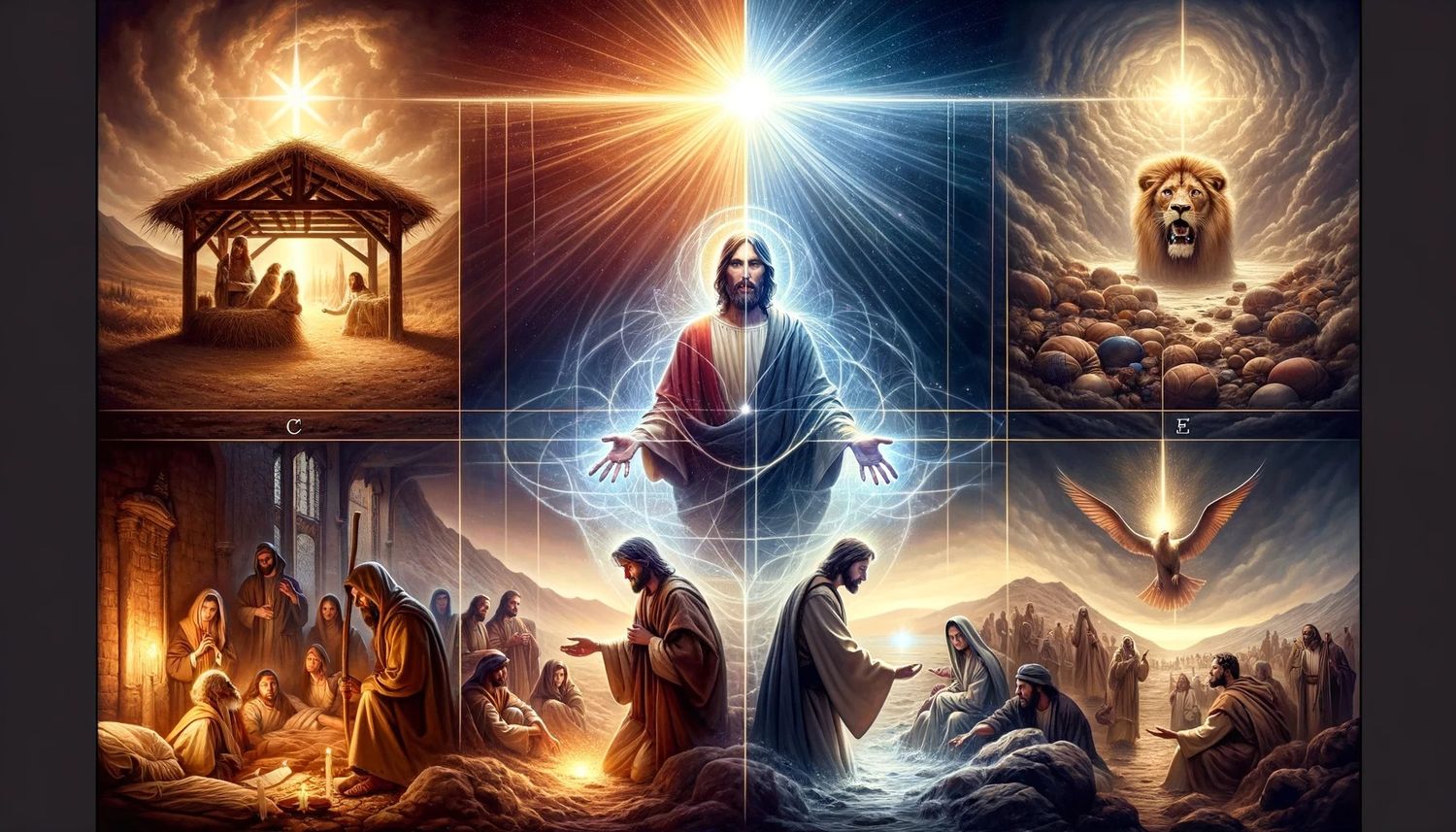Home>Christian Videos>Bible Stories>What Was The Impact Of The Gospels And The New Testament


Bible Stories
What Was The Impact Of The Gospels And The New Testament
Published: March 6, 2024
Ericka Andersen, an editor at Christian.net, expertly merges digital strategy with content creation, focusing on faith and societal issues. Her communication skills enhance the platform's engaging narratives, fostering meaningful dialogue on belief's impact on society.
Discover the profound impact of the Gospels and the New Testament on Christianity and the world. Explore the timeless wisdom and teachings of these Bible stories.
(Many of the links in this article redirect to a specific reviewed product. Your purchase of these products through affiliate links helps to generate commission for Christian.net, at no extra cost. Learn more)
Table of Contents
Introduction
The impact of the Gospels and the New Testament on the world has been profound and far-reaching. These sacred texts have not only shaped the course of religious history but have also left an indelible mark on the cultural, social, and political landscape of the world. In this article, we will explore the historical context of the Gospels and the New Testament, their religious and spiritual impact, their influence on Western culture and civilization, as well as the global spread of Christianity. By delving into these aspects, we can gain a deeper understanding of the significance of these texts and their enduring legacy.
The Historical Context of the Gospels and the New Testament
The Gospels, which include the books of Matthew, Mark, Luke, and John, are the first four books of the New Testament. They were written between 70-100 AD, a few decades after the death of Jesus Christ. These texts provide a detailed account of the life, teachings, death, and resurrection of Jesus, as well as the early Christian community. The New Testament, consisting of the Gospels, the Acts of the Apostles, the Epistles, and the Book of Revelation, was compiled and canonized in the 4th century. The historical context of the Gospels and the New Testament is rooted in the political, social, and religious milieu of the ancient Mediterranean world. During this time, the Roman Empire held sway over the region, and various religious and philosophical movements, including Judaism, Hellenistic traditions, and mystery cults, were prevalent. The Gospels and the New Testament emerged within this diverse and dynamic environment, and their teachings and message were shaped by the cultural and historical forces of the time.
The Gospels and the New Testament were written in a period of significant religious and political upheaval. The Jewish people were living under Roman occupation, and there was a growing sense of anticipation for a messianic figure who would deliver them from oppression. It was in this context that Jesus of Nazareth emerged as a charismatic preacher and healer, proclaiming the arrival of the Kingdom of God and challenging the religious authorities of his time. His teachings and actions, as recorded in the Gospels, sparked a movement that would eventually become known as Christianity. The New Testament documents the spread of this movement, the struggles and triumphs of the early Christian communities, and the theological debates that shaped the nascent faith. The historical context of the Gospels and the New Testament provides valuable insights into the origins of Christianity and the challenges faced by its early adherents.
The Gospels and the New Testament also reflect the cultural and linguistic diversity of the ancient world. The Gospels were written in Greek, the lingua franca of the Eastern Mediterranean, and they were intended to be accessible to a wide audience. The authors of the Gospels drew upon a variety of sources, including oral traditions, earlier written accounts, and their own experiences, to craft narratives that would resonate with their intended readers. The New Testament, likewise, contains letters and writings that were addressed to specific communities and individuals, addressing their concerns and offering guidance in matters of faith and practice. The historical context of the Gospels and the New Testament illuminates the rich tapestry of beliefs, practices, and experiences that contributed to the formation of early Christianity.
In summary, the historical context of the Gospels and the New Testament provides a window into the world in which these sacred texts emerged. They bear the imprint of a time of religious fervor, political tension, and cultural exchange, and their enduring relevance testifies to their profound impact on the course of human history.
The Religious and Spiritual Impact of the Gospels and the New Testament
-
Foundation of Christian Faith: The Gospels and the New Testament form the cornerstone of the Christian faith. They provide the theological framework, ethical guidelines, and spiritual teachings that have shaped the beliefs and practices of Christians for over two millennia. The life, death, and resurrection of Jesus Christ, as depicted in the Gospels, are central to Christian theology, serving as the focal point of salvation and redemption. The New Testament writings, including the Epistles and the Book of Revelation, offer guidance on matters of doctrine, morality, and eschatology, providing believers with a comprehensive understanding of their faith.
-
Spiritual Guidance and Inspiration: The Gospels and the New Testament serve as a source of spiritual guidance and inspiration for millions of people around the world. The teachings of Jesus, as recorded in the Gospels, offer timeless wisdom on love, compassion, forgiveness, and the pursuit of righteousness. The New Testament writings provide narratives of faith, perseverance, and divine intervention, offering hope and solace to those facing adversity. Through their portrayal of the life and teachings of Jesus, the Gospels convey a message of divine love and the possibility of spiritual transformation, resonating deeply with individuals seeking meaning and purpose in their lives.
-
Formation of Christian Identity and Community: The Gospels and the New Testament have played a pivotal role in shaping the identity and communal life of Christian believers. The narratives of Jesus' ministry, his interactions with his disciples, and the early Christian communities depicted in the New Testament writings have served as a model for Christian discipleship and communal living. The Epistles offer practical guidance on issues of leadership, worship, and ethical conduct within the Christian community, fostering a sense of unity and shared purpose among believers. The New Testament's emphasis on love, service, and mutual support has contributed to the formation of vibrant Christian communities that seek to embody the values and teachings found in these sacred texts.
-
Impact on Christian Worship and Sacraments: The Gospels and the New Testament have significantly influenced the liturgical practices and sacramental life of the Christian church. The accounts of Jesus' Last Supper, as recorded in the Gospels, form the basis for the Eucharistic celebration, a central ritual in Christian worship. The New Testament writings provide theological insights into the significance of baptism, the Lord's Supper, and other sacramental rites, shaping the way in which Christians understand and participate in these sacred acts. The Gospels and the New Testament continue to inform the liturgical calendar, the lectionary readings, and the theological reflections that underpin Christian worship and sacramental theology.
In summary, the religious and spiritual impact of the Gospels and the New Testament is profound and multifaceted, shaping the beliefs, practices, and communal life of Christian faith communities across the globe. These sacred texts continue to inspire, guide, and nurture the spiritual lives of believers, serving as a wellspring of faith and devotion.
The Influence on Western Culture and Civilization
The Gospels and the New Testament have exerted a profound influence on Western culture and civilization, shaping the values, ethics, and artistic expressions that have defined the Western world. Here are some ways in which these sacred texts have left an indelible mark on Western culture:
-
Moral and Ethical Framework: The teachings of Jesus Christ, as presented in the Gospels, have provided a moral and ethical framework that has underpinned Western civilization. Concepts such as love for one's neighbor, compassion for the marginalized, and the pursuit of justice and righteousness have informed Western ethical thought and social values. The New Testament's emphasis on humility, forgiveness, and self-sacrificial love has permeated Western moral philosophy, influencing the development of ethical systems and the formulation of laws and social policies.
-
Literary and Artistic Inspiration: The stories, parables, and teachings found in the Gospels and the New Testament have inspired some of the greatest literary and artistic works in Western history. From the masterpieces of Renaissance art to the enduring literary works of authors such as Dante, Milton, and Dostoevsky, the themes and motifs drawn from the Gospels have provided a rich source of inspiration for creative expression. The New Testament's narratives of redemption, suffering, and divine grace have been a wellspring of artistic exploration, giving rise to timeless works of literature, music, and visual art that continue to resonate with audiences today.
-
Political and Social Impact: The Gospels and the New Testament have played a pivotal role in shaping the political and social landscape of Western civilization. The New Testament's teachings on the dignity of every individual, the call to serve the marginalized, and the pursuit of peace and reconciliation have informed movements for social justice, human rights, and humanitarian aid. The Christian ethical principles derived from the Gospels have influenced the development of democratic ideals, the abolition of slavery, and the promotion of equality and human dignity within Western societies.
-
Cultural and Linguistic Legacy: The Gospels and the New Testament have left a lasting imprint on the cultural and linguistic heritage of the Western world. The translation of the Bible into vernacular languages, such as the King James Version in English, has contributed to the development and enrichment of Western languages and literary traditions. The phrases, parables, and teachings from the Gospels have become embedded in the fabric of Western culture, shaping idiomatic expressions, proverbs, and ethical discourse.
In summary, the Gospels and the New Testament have played a pivotal role in shaping the moral, artistic, political, and cultural landscape of Western civilization. Their enduring influence continues to resonate in the values, beliefs, and creative expressions that define the Western world.
The Spread of Christianity and Global Impact
The spread of Christianity from its origins in the ancient Mediterranean world to its global impact is a testament to the enduring influence of the Gospels and the New Testament. The early Christian movement, as documented in the New Testament, experienced remarkable growth and expansion, eventually becoming a global faith with adherents spanning diverse cultures and continents. Here are some key aspects of the spread of Christianity and its global impact:
-
Missionary Endeavors: The New Testament records the missionary efforts of early Christian leaders, such as the apostle Paul, who traveled extensively to proclaim the message of Jesus Christ to diverse audiences. The missionary journeys described in the Book of Acts and the letters of the New Testament demonstrate the fervent commitment of early Christians to share the gospel with people from various cultural and religious backgrounds. These missionary endeavors laid the groundwork for the global spread of Christianity, as communities of believers were established in regions beyond the borders of the Roman Empire.
-
Cultural Adaptation and Syncretism: As Christianity spread to different parts of the world, it encountered diverse cultural traditions and belief systems. The New Testament provides insights into the challenges and opportunities presented by this cultural diversity, as early Christian communities grappled with questions of religious practice, social customs, and theological interpretation. The process of cultural adaptation and syncretism, as documented in the New Testament, reflects the dynamic and multifaceted nature of the global expansion of Christianity, as the faith interacted with and assimilated elements from various cultural contexts.
-
Formation of Global Christian Communities: The New Testament writings, particularly the Epistles, bear witness to the formation of Christian communities in regions such as Asia Minor, Greece, and Rome. These communities, as depicted in the New Testament, grappled with issues of identity, faithfulness, and communal life in the midst of diverse cultural and religious environments. The New Testament provides a glimpse into the challenges and triumphs of these early global Christian communities, offering valuable lessons for contemporary expressions of Christianity in a globalized world.
-
Influence on World History and Culture: The global impact of Christianity, as shaped by the teachings and narratives of the Gospels and the New Testament, has left an indelible mark on world history and culture. The spread of Christianity has intersected with major historical developments, such as the fall of the Roman Empire, the medieval period, the age of exploration, and the modern era. The New Testament's message of redemption, reconciliation, and the transformative power of faith has resonated with people from diverse cultural and geographical backgrounds, contributing to the formation of global Christian traditions and expressions.
-
Contemporary Global Presence: Today, Christianity is a global faith with a presence in virtually every part of the world. The New Testament's portrayal of the early spread of Christianity provides a historical foundation for understanding the contemporary global landscape of Christian belief and practice. The New Testament's emphasis on the universal scope of the gospel message and the inclusive nature of Christian community continues to inform the diverse expressions of Christianity found in different global contexts, from traditional heartlands to emerging centers of Christian growth.
In summary, the spread of Christianity and its global impact, as depicted in the New Testament, is a testament to the enduring significance of the Gospels and the New Testament in shaping the course of human history and the cultural tapestry of the world. The New Testament's portrayal of the early spread of Christianity offers valuable insights into the dynamic and transformative nature of the global Christian movement, providing a foundation for understanding the contemporary global presence of Christianity.
Conclusion
In conclusion, the Gospels and the New Testament have had a profound and multifaceted impact on the world, shaping religious beliefs, cultural expressions, and global history. The historical context of the Gospels and the New Testament provides valuable insights into the origins of Christianity and the diverse cultural milieu in which these sacred texts emerged. The religious and spiritual impact of the Gospels and the New Testament is evident in their foundational role in shaping Christian faith, providing spiritual guidance and inspiration, and fostering the formation of Christian communities. The influence of the Gospels and the New Testament on Western culture and civilization is reflected in their impact on moral and ethical frameworks, artistic and literary expressions, political and social values, and linguistic heritage. The global spread of Christianity, as depicted in the New Testament, attests to the enduring significance of these sacred texts in shaping the global Christian movement and its contemporary presence. In sum, the Gospels and the New Testament continue to resonate with believers and non-believers alike, serving as a testament to their enduring legacy and influence on the course of human history.














